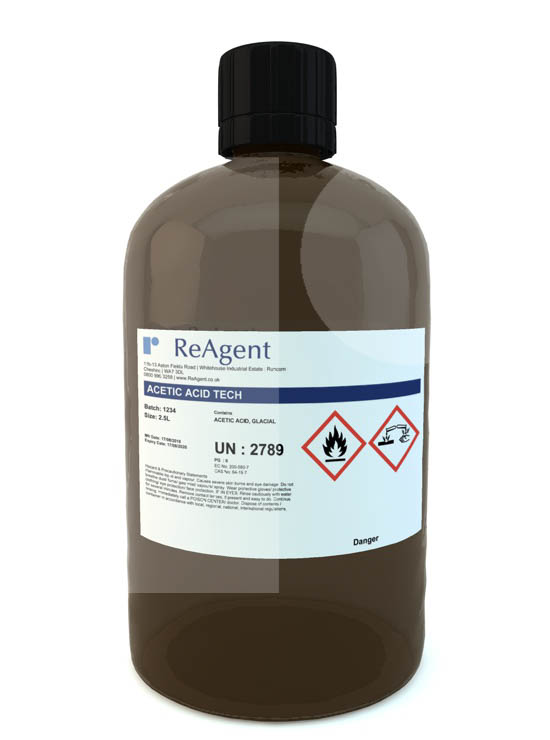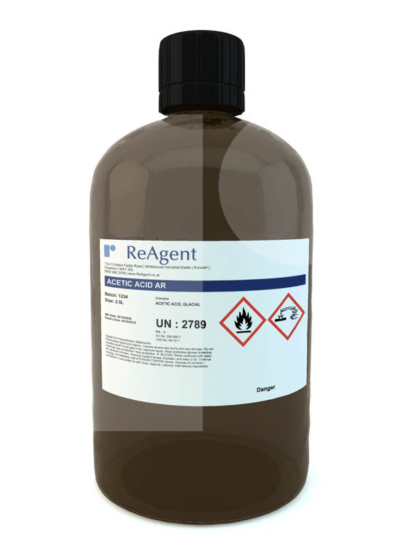-

Acetic Acid (CH3COOH)
2 products -

Ammonia Solutions (NH4OH)
2 products -

ASTM Reagents
1 product -

Caustic Soda
4 products -

Citric Acid (C6H8O7)
2 products -

Ethanoic Acid
2 products -

Hydrogen Peroxide (H2O2)
1 product -

Nitric Acid (HNO3)
4 products -

Phosphoric Acid (H3PO4)
1 product -

Sodium Chloride (NaCl)
1 product -

Sodium Hydroxide (NaOH)
4 products -

Sulfuric Acid
5 products -

Sulphuric Acid (H2SO4)
5 products
How to place an order


Watch this video to find out how to place an order
Why Buy Laboratory Reagents Online From ReAgent?
As the name suggests, ReAgent UK is your number one port of call when you’re looking to buy chemical, clinical and pharmaceutical reagents. With almost 50 years of experience and internationally recognised quality, ReAgent is ideally placed to handle all of your orders.
We have a variety of reagents available just for you:
- ABB Analyser Solutions
- Ammonia Solutions (NH3)
- Applikon Analyser Solutions
- ASTM Reagents
- Buffer Solutions
- Glyoxal Bis
- Kent EIL Analyser Solutions
- Phosphoric Acid
- Silkostat Analyser Solutions
- Sodium Thiosulphate
- SSN Wash Solution
- Sulphuric Acid
To find the chemical and analytical reagent you need, please click on the images above and you will find details of pack sizes, prices and price breaks offered for multiple purchases.
ReAgent is a Quality Assured supplier working to the stringent requirements of ISO 9001 Quality Standard and ISO 14001 Environmental Standard. We also hold the ISO 45001 Occupational Health & Safety Standard. That’s why when you buy from us, you know you’re buying from one of the most trusted suppliers in the UK.
What Are Reagents?
A reagent is a chemical element, compound or mixture that triggers a chain of chemical reactions when added to a system. A reagent is also used to test if a certain chemical reaction occurs. Many biochemical and industrial processes involve reagents.
A reagent may simply speed up a chemical reaction but is not consumed in the process like catalysts. In some processes, a reagent directly participates in a chemical reaction and is consumed in the process. In this case, a reagent is also a reactant.
When it comes to biochemical reactions that are aided by enzyme catalysts, the reactants are called substrates. Enzymes that serve as catalysts are also reagents.
What Are Reagents Used For?
Reagents are used either as catalysts or as reactants in synthesizing a wide range of inorganic and organic compounds. They are mainly used in industrial processes for manufacturing various products, from medicines to plastics.
Some reagents are used as chemical indicators for diagnostic testing (e.g. glucose test) and forensic investigations (e.g. luminol for detecting invisible blood splatter on surfaces). Here are some examples of common reagents and their uses:
- Acetylene – a hydrocarbon and the simplest alkyne, which is commonly used as a fuel and a chemical building block
- Ammonia – a chemical precursor used in manufacturing fertilisers
- Ammonium hydroxide – the aqueous form of ammonia traditionally used for qualitative inorganic analysis
- Azobisisobutyronitrile – commonly used as a foamer in the manufacture of plastics and rubber products
- Baeyer’s reagent – an alkaline solution of dissolved potassium permanganate. Commonly used as a qualitative biochemical test for the presence of unsaturation, such as double bonds
- Chromic acid – a very corrosive oxidising agent uses as an intermediate in chromium plating
- Collins reagent – used to selectively oxidize primary alcohols to convert into aldehyde
- Copper(I) iodide – has a wide range of applications that include synthesis of organic compounds and cloud seeding
- Dess–Martin periodinane – commonly used for oxidising primary alcohols to aldehydes and secondary alcohols
- Dicyclohexylcarbodiimide – used in artificial peptide synthesis to connect amino acids
- Dihydropyran – used as a protecting group for alcohols in organic synthesis
- Sodium hydroxide – used as an electrolyte and has several industrial applications like manufacturing detergents. It reacts with acids to form salts
- Sodium nitrite – has important biochemical application for converting amines into diazo compounds
- Sulfuric acid – most commonly used for various industrial applications as a precursor for various synthetic chemicals
- Tetrahydrofuran – a precursor for synthesising polymers
How Are Reagents Made?
Some reagents are naturally occurring and do not need to be synthesised but simply need to be purified. For instance, purified water is commonly used as a reagent in biomedical and industrial lab testing.
Some reagents like antibodies (polyclonal and monoclonal) simply need to be isolated from other biological and biochemical substances. Biological reagents are important in synthesising drugs, manufacturing vaccines, and testing for pathogens.
Industrial-grade reagents are either distilled forms of naturally occurring substances like hydrocarbons from fossil fuels or they are synthesised from existing chemicals.
Buy Reagents from UK Suppliers That Businesses Trust
Many of our customers are household names and industry giants. Some have even been buying reagents from us for almost 50 years. No matter what industry you’re in, we have the expertise to meet your business needs and exceed your expectations.
Some of the industries we have worked with include:
- The automotive industry
- The chemical industry
- The pharmaceutical industry
- Water treatment
- Power generation
- The food industry
- Environmental services
Our high-quality products and first-class customer services are just two reasons why our customers keep coming back. But don’t take our word for it – contact our expert sales team to find out what we can do for your business.
Order Now for Next-Day Delivery
ReAgent manufactures and supplies chemicals in accordance with all current relevant UK legislation and in accordance with health and safety requirements.
Our staff are highly experienced professionals with a wealth of technical knowledge. Our many repeat orders bear testament to the enviable reputation we have within the UK chemical industry.
All our products come with a 100% quality guarantee, and we also offer discounts when buying in bulk. We also provide nationwide next-day delivery that ensures your order is shipped as soon as possible.
Many customers enjoy the convenience of being able to buy chemicals online but we are also happy to process orders placed by phone and post.
Need Bespoke Chemicals?

Watch this video to find out how ReAgent can help

Related articles from The Chemistry Blog

What Are The Common Uses Of Acetic Acid?
From the dressings on our salads to the glues and paints that surround us, acetic acid is far more than just a household condiment. Though most people recognise it as the tangy component of vinegar, this simple organic compound has

The Surprising Reaction Of Nitric Acid & Ammonia
When nitric acid reacts with ammonia, it produces a white crystalline salt called ammonium nitrate (NH4NO3). As a solid, ammonium nitrate is hygroscopic, which means it attracts moisture. Although the substance dissolves easily in water, it does not form hydrates.

Uses Of Citric Acid In Manufacturing & Everyday Life
Citric acid is a naturally-occurring substance found in citrus fruits like lemons and limes, although it can also be manufactured on an industrial scale. When manufactured, it’s commonly used in food processing as a flavouring, preservative, or colourant. Citric acid

What Are The Common Uses Of Acetic Acid?
From the dressings on our salads to the glues and paints that surround us, acetic acid is far more than just a household condiment. Though most people recognise it as the tangy component of vinegar, this simple organic compound has

The Surprising Reaction Of Nitric Acid & Ammonia
When nitric acid reacts with ammonia, it produces a white crystalline salt called ammonium nitrate (NH4NO3). As a solid, ammonium nitrate is hygroscopic, which means it attracts moisture. Although the substance dissolves easily in water, it does not form hydrates.

Uses Of Citric Acid In Manufacturing & Everyday Life
Citric acid is a naturally-occurring substance found in citrus fruits like lemons and limes, although it can also be manufactured on an industrial scale. When manufactured, it’s commonly used in food processing as a flavouring, preservative, or colourant. Citric acid
Browse Our Most Popular Chemicals (A-Z)
Can’t find what you need? Call 0800 9555 798 or Contact Us
Popular Chemicals (A-Z)
Can’t find what you need? Call 0800 9555 798 or Contact Us
Absolute Ethanol
Acetic Acid (CH3COOH)
Acetone
Ammonia Solutions (NH4OH)
Butanone
Caustic Soda
Citric Acid (C6H8O7)
Deionised Water
Demineralised Water
Denatured Alcohol IMS
Dichloromethane (CH2Cl2)
Distilled Water
EP Water
Ethanediol
Ethanoic Acid
Ethyl Acetate (C4H8O2)
Ethyl Alcohol
Ethyl Ethanoate
Ethylene Glycol
Glycerol / Glycerine / Glycerin
Hydrochloric Acid (HCL)
Hydrogen Peroxide (H2O2)
Industrial Methylated Spirits
Isopropyl Alcohol
Laboratory Water (Grade 3)
Methanol (MeOH)
Methyl Ethyl Ketone Tech (MEK)
Methylene Chloride
Mixed Alcohol Solvent ASTM
Monoethylene Glycol
Monopropylene Glycol
Muriatic Acid
Nital Solution
Nitric Acid (HNO3)
Phosphoric Acid (H3PO4)
Polyethylene Glycol (PEG)
Propan-2-ol / Isopropanol (C3H8O)
Propanediol
Propylene Glycol
Purified Water
Silver Nitrate (AgNO3)
Sodium Chloride (NaCl)
Sodium Hydroxide (NaOH)
Sulfuric Acid
Sulphuric Acid (H2SO4)
Synthetic Sea Water
Tetrahydrofuran (THF)
Toluene (C7H8)
Ultrapure Water
USP Purified Water
USP Water for Injection
…VIEW ALL CHEMICALS





















